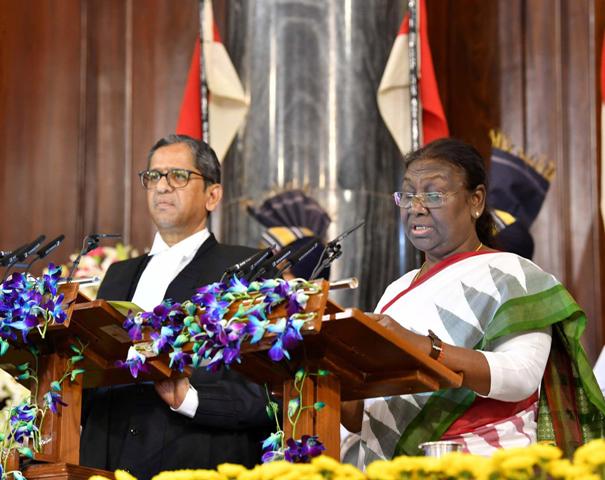 25th July, 2022: Droupadi Murmu sworn in as the 15th president of India in New Delhi. [photo credit: Xinhua/Alamy Live News]
25th July, 2022: Droupadi Murmu sworn in as the 15th president of India in New Delhi. [photo credit: Xinhua/Alamy Live News]
[This is an excerpt from an article in The Round Table: The Commonwealth Journal of International Affairs.]
In the recently held Presidential election, Droupadi Murmu was elected the 15th President of the Indian Republic. Many Indian politicians, social commentators, and journalists among others, hailed her elevation as a ‘historic’ moment for India. This is primarily because Murmu is India’s first tribal person to occupy the highest office in the country.
Murmu contested the election as the candidate of the ruling Bharatiya Janata Party-led National Democratic Alliance (NDA) against the veteran political leader, Yashwant Sinha, who ran as the joint candidate of the Opposition parties in India. Murmu won the election by securing a record 64.03 percent of the total votes polled. Apart from the parliamentarians and legislators of the NDA, many non-NDA parties expressed their support and voted for Murmu.
India at 75: The Round Table, Volume 111, Issue 3 (2022)
Murmu’s election to the highest office carries immense significance. This is primarily because not only has India not had a tribal as the President but because leaders from the Scheduled Tribe (ST) community have hardly been given any importance for decades. Murmu’s journey from a nondescript village in Rairangpur in the eastern Indian State of Odisha to Raisina Hill, the majestic venue of the President’s House, is undoubtedly a testimony to India’s democratic credentials. Murmu began her political career as a councillor in a local body, got elected as a state legislator, and eventually worked her way up to become a minister in the Biju Janata Dal-Bharatiya Janata Party government in Odisha from 2000- 2004. She also served as Governor of Jharkhand state from 2015 to 2021.
In India, the President is the head of the state and is indirectly elected by an Electoral College consisting of members of parliament and members of all state legislative assemblies. The Constitution of India lays down that the President should act on the advice of the prime minister and the Council of Ministers. However, that does not mean that the office of the President is entirely titular in nature. For instance, when no political party can get an absolute parliamentary majority in the national elections or the ruling party loses its majority, the President has the power to decide which party should form the next government. The President also takes a call on the sitting Prime Minister’s advice to dissolve parliament and order snap elections, though no President has, to date, defied such advice.
Another crucial power that the President has is to give assent to Bills passed by parliament. If the President has reservations about any measure, he/she can send it back to the Union Council of Ministers, with his/her recommendations. If the Council of Ministers returns the Bill without incorporating the recommendations, the President is compelled to give formal assent to the Bill. In case the President has reservations about a Bill, he/she can exercise the discretionary power of ‘Pocket Veto’ by not taking any action on the Bill – neither sign it nor send it back to the Council of Ministers for reconsideration. In that case, the Bill remains pending till the end of the President’s tenure.
Anish Esteves is a journalist and author, Bombay, India.



